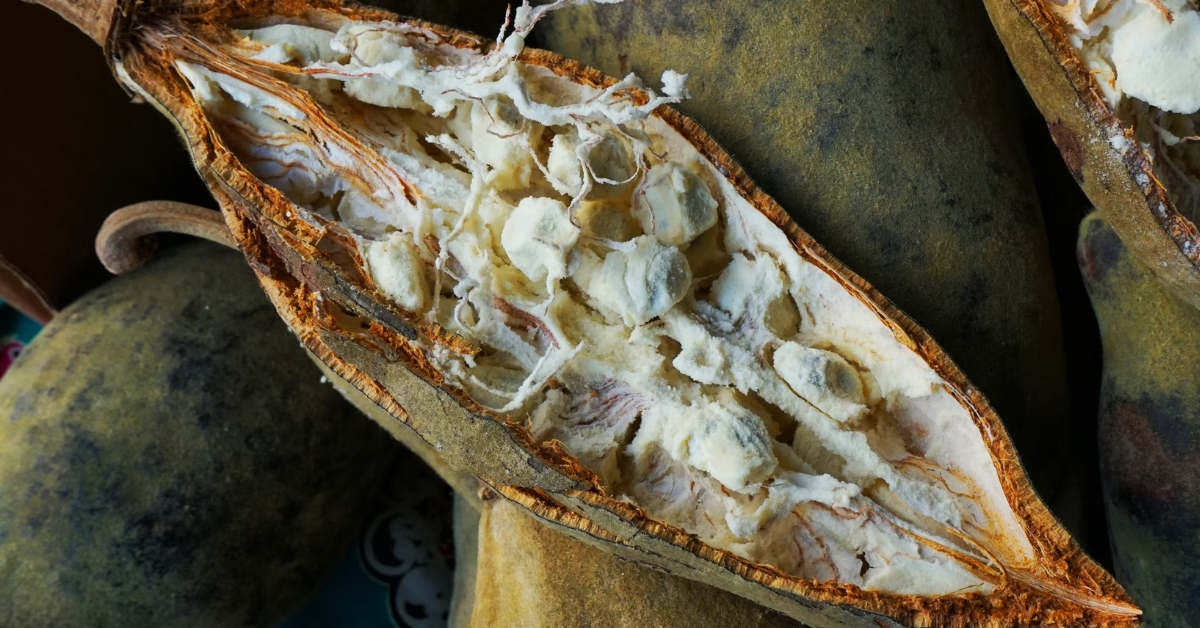The baobab fruit comes from the baobab tree, native to the African continent. Known as the “tree of life,” baobab trees are distinct due to their enormous, upside-down-looking trunks, which can store up to 32,000 gallons of water. The fruit is usually oval-shaped, with a hard, leathery shell, and contains a powdery pulp, seeds, and fibers.
Baobab fruit has been consumed for centuries in Africa, and its recent rise in popularity worldwide has labeled it a “superfood.” It thrives in regions like West and Central Africa, Madagascar, and Australia. The fruit has a tart, citrus-like taste and is often consumed in powder form, making it a versatile ingredient for smoothies, energy bars, and even skincare products.
Nutritional Benefits of Baobab Fruit: Why You Should Include It in Your Diet
The nutritional value of baobab fruit is one of the key reasons it has gained attention in the health world. It is packed with essential vitamins, minerals, and antioxidants. Here’s a closer look at the nutritional powerhouse:
- Vitamin C: Baobab fruit contains up to 10 times the vitamin C found in oranges. This powerful antioxidant helps boost the immune system, aids in collagen production, and promotes healthy skin.
- Fiber: Baobab fruit is rich in fiber, which supports digestive health, improves gut function, and may help control weight by making you feel fuller for longer.
- Antioxidants: In addition to vitamin C, baobab fruit contains polyphenols that fight oxidative stress in the body, helping to prevent chronic diseases and slow down aging.
- Calcium & Magnesium: The fruit is also a good source of calcium, which supports bone health, and magnesium, which is essential for muscle function and relaxation.
How Baobab Fruit Boosts Your Immune System
Baobab fruit’s immune-boosting properties are largely due to its high vitamin C content. This vitamin is essential for the proper functioning of the immune system, as it enhances the production of white blood cells that fight off infections. By including baobab fruit in your diet, you can improve your body’s ability to ward off colds, flu, and other infections.
The antioxidants in baobab fruit also play a critical role in reducing inflammation and oxidative stress, both of which can weaken the immune system. This makes baobab fruit an excellent food to include during cold and flu season, or for anyone looking to boost their immune defenses year-round.
Baobab Fruit and Skin Health: A Natural Beauty Remedy
Baobab fruit is a natural skincare solution packed with antioxidants and vitamin C, two essential ingredients for maintaining youthful and healthy skin. These nutrients help fight free radicals that cause skin aging and promote collagen production for smoother and firmer skin.
The fruit’s high vitamin C content also helps brighten the skin and reduce the appearance of dark spots and pigmentation. Many cosmetic companies now incorporate baobab fruit extract into their products, such as moisturizers, serums, and lotions.
For a DIY skin remedy, you can create a face mask by mixing baobab powder with a little water or honey. The result is a hydrating mask that can help nourish your skin and restore its glow.
Baobab Fruit Powder: Uses, Benefits, and How to Incorporate It into Your Routine
Baobab fruit powder is a convenient and nutrient-dense form of the fruit. Made by drying the pulp inside the fruit and grinding it into a fine powder, baobab powder is rich in vitamin C, fiber, and antioxidants.
One of the best ways to incorporate baobab fruit powder into your routine is by adding it to your morning smoothie. Simply blend it with fruits like banana, berries, and some almond milk for a refreshing, energy-boosting drink. You can also stir it into yogurt, oatmeal, or even baked goods like muffins or pancakes.
For those who prefer a savory option, baobab powder can be sprinkled on salads or incorporated into sauces for a tangy twist.
Baobab Fruit and Weight Loss: How This Superfood Helps Shed Pounds
Baobab fruit is considered a weight-loss-friendly superfood due to its high fiber content. Fiber is essential for digestion and plays a major role in helping you feel full longer, reducing overall calorie intake. By keeping hunger at bay, baobab fruit helps prevent overeating.
Moreover, the fruit’s high antioxidants help regulate blood sugar levels, preventing spikes and crashes that could lead to cravings. Incorporating baobab into your meals or snacks may help control appetite and contribute to healthier eating habits, aiding your weight loss journey.
The Amazing Antioxidants in Baobab Fruit: A Powerful Weapon Against Aging
Baobab fruit is a powerhouse of antioxidants such as vitamin C and polyphenols, both of which are vital for combating free radicals. Free radicals can damage cells and contribute to the aging process, making baobab fruit an effective tool in fighting wrinkles, sagging, and other visible signs of aging.
The antioxidants in baobab fruit also play a role in reducing the risk of chronic diseases like heart disease, diabetes, and certain types of cancer. This makes it not just a beauty food, but a longevity food as well.
Baobab Fruit for Energy: How This Natural Superfood Fuels Your Body
If you’re feeling sluggish, baobab fruit can provide a natural energy boost. The fruit contains complex carbohydrates and vitamin C, which work together to sustain your energy levels throughout the day. Unlike sugary snacks or caffeine, baobab fruit provides a steady, long-lasting source of energy without the crash.
Adding baobab fruit to your daily routine can help you feel more energized during workouts, improve your focus at work, and reduce feelings of fatigue.
Baobab Fruit and Digestive Health: The Fiber Content You Need
Baobab fruit is a digestive health booster due to its high fiber content, which supports healthy bowel movements and improves gut health. The soluble fiber in baobab fruit forms a gel-like substance in the intestines that can aid in digestion and promote the growth of good bacteria in the gut.
Regular consumption of baobab fruit can help prevent constipation, promote regularity, and even reduce bloating and gas. If you’re looking for a natural way to improve your digestive health, baobab fruit is an excellent option.
Is Baobab Fruit Safe? Understanding Potential Side Effects and Risks
While baobab fruit is generally safe for most people, it’s important to be aware of potential side effects. Some individuals may experience allergic reactions, especially those with allergies to other fruits or tree nuts. If you have any concerns, it’s best to consult with a healthcare provider before incorporating baobab fruit into your diet.
Additionally, consuming baobab fruit in large amounts may lead to digestive discomfort due to its high fiber content. Moderation is key.
How to Eat Baobab Fruit: A Step-by-Step Guide
Eating baobab fruit is easy once you know how to prepare it. Here’s a simple guide to eating this nutritious fruit:
- Harvest the fruit: Baobab fruit is typically harvested when it falls from the tree, usually between June and September.
- Open the fruit: Use a sharp tool or your hands to crack open the hard outer shell. Inside, you’ll find a powdery pulp and seeds.
- Separate the pulp and seeds: The pulp can be eaten directly or dried and ground into powder. The seeds can be used to extract oil or added to smoothies.
Baobab Fruit in African Culture: A Traditional Superfood with Modern Benefits
In African cultures, baobab fruit has been used for centuries due to its nutritional benefits and versatility. The fruit is not only eaten but also used in traditional medicine to treat various ailments like fever, malaria, and digestive problems. The baobab tree is often referred to as “The Tree of Life” for its ability to provide food, water, and shelter.
Today, as the world turns to natural remedies and superfoods, baobab fruit has gained global recognition as a nutrient-rich powerhouse.
Can Baobab Fruit Help with Diabetes? Exploring Its Role in Blood Sugar Regulation
Baobab fruit shows promising potential in blood sugar regulation. The fruit’s fiber helps slow the absorption of sugar in the bloodstream, preventing spikes and crashes. Some studies suggest that baobab fruit may help improve insulin sensitivity, which is beneficial for individuals with diabetes or prediabetes.
Incorporating baobab fruit into a balanced diet could be a natural way to support blood sugar management.
Baobab Fruit in the Modern Diet: How Global Interest Is Growing
In recent years, there has been an explosion of interest in baobab fruit across the globe. As people become more health-conscious, the demand for nutrient-dense, plant-based foods has skyrocketed. Baobab is now widely available in various forms, such as powder, capsules, and juice, making it easy to include in your daily diet.
Baobab Fruit Sustainability: The Eco-Friendly Benefits of This Ancient Superfood
Baobab fruit isn’t just good for your health—it’s also good for the planet. The tree is drought-resistant and thrives in arid environments, making it an eco-friendly crop. Furthermore, baobab fruit is often harvested by local communities, providing a sustainable source of income for farmers in Africa.
By choosing baobab products, you’re supporting sustainable agriculture and helping preserve the environment.
You May Also Like: How to Become a Lawyer: Complete Guide to Law School & Legal Career
Conclusion:
Baobab fruit is an incredible superfood packed with nutrients that support a healthy immune system, skin, digestive health, and more. From boosting energy levels to helping with weight loss and blood sugar regulation, it’s clear that this ancient fruit has a place in modern diets. Whether you’re adding it to smoothies, using it in skincare products, or simply enjoying it as a snack, baobab fruit is a powerful ally for your health.
FAQs:
- What is baobab fruit?
Baobab fruit is a nutrient-rich fruit from the baobab tree, native to Africa. It’s known for its high vitamin C, fiber, and antioxidant content. - How do I use baobab powder in my diet?
Baobab powder can be added to smoothies, oatmeal, yogurt, or baked goods for a boost of nutrition and tangy flavor. - What are the health benefits of baobab fruit?
Baobab fruit supports immune health, aids digestion, boosts energy, and promotes skin health due to its high vitamin C and antioxidants. - Can baobab fruit help with weight loss?
Yes, its high fiber content helps control appetite, promoting a feeling of fullness and aiding weight management. - Is baobab fruit good for the skin?
Yes, baobab fruit’s vitamin C and antioxidants help fight aging signs and promote collagen production for healthier skin. - Where does baobab fruit come from?
Baobab fruit grows on baobab trees found mainly in Africa, as well as parts of Madagascar and Australia. - Can baobab fruit improve digestion?
Yes, baobab fruit is rich in fiber, which supports healthy digestion and helps prevent constipation. - What are the side effects of baobab fruit?
In general, baobab fruit is safe, but consuming it in excess may cause digestive discomfort due to its high fiber content. - How does baobab fruit boost energy?
Baobab fruit provides a natural energy boost thanks to its complex carbohydrates, vitamin C, and antioxidants, offering sustained energy. - Can I grow a baobab tree in my backyard?
Yes, baobab trees can be grown in warm climates with well-drained soil and plenty of sunlight, but they need a lot of space to thrive.












Throughout this grand scheme of things you secure an A for effort. Exactly where you misplaced everybody ended up being in your details. You know, it is said, details make or break the argument.. And it couldn’t be much more correct in this article. Having said that, let me tell you what exactly did deliver the results. Your article (parts of it) is pretty persuasive and this is possibly why I am taking an effort in order to comment. I do not make it a regular habit of doing that. Second, despite the fact that I can certainly see a jumps in reason you come up with, I am definitely not convinced of exactly how you appear to unite your details that make your final result. For now I will yield to your position however trust in the future you actually link your facts better.
You should participate in a contest for among the finest blogs on the web. I will suggest this site!
Great web site. Plenty of useful info here. I am sending it to some friends ans also sharing in delicious. And certainly, thanks for your effort!
I truly enjoy reading on this website , it has got good blog posts.
Rattling informative and fantastic complex body part of articles, now that’s user genial (:.
I?¦m not sure where you’re getting your information, however good topic. I must spend some time learning much more or figuring out more. Thanks for excellent info I was in search of this information for my mission.
Very fantastic information can be found on blog.
Great amazing things here. I am very happy to see your article. Thank you a lot and i’m taking a look ahead to touch you. Will you please drop me a e-mail?
Hello my loved one! I wish to say that this article is awesome, great written and include almost all important infos. I would like to see extra posts like this .
Merely wanna input on few general things, The website design and style is perfect, the subject material is very wonderful : D.
of course like your web site however you have to take a look at the spelling on quite a few of your posts. Many of them are rife with spelling problems and I find it very bothersome to inform the reality on the other hand I’ll surely come again again.
I like the valuable info you provide in your articles. I’ll bookmark your blog and check again here regularly. I am quite certain I’ll learn lots of new stuff right here! Best of luck for the next!
Simply wanna say that this is invaluable, Thanks for taking your time to write this.
That is really interesting, You are an overly skilled blogger. I’ve joined your feed and sit up for seeking extra of your wonderful post. Additionally, I have shared your web site in my social networks!
Aw, this was a very nice post. In thought I want to put in writing like this moreover – taking time and actual effort to make a very good article… however what can I say… I procrastinate alot and not at all appear to get something done.
I really like your writing style, fantastic info, regards for putting up :D. “I hate mankind, for I think myself one of the best of them, and I know how bad I am.” by Joseph Baretti.
Can I simply say what a aid to find someone who actually is aware of what theyre talking about on the internet. You undoubtedly know learn how to bring an issue to mild and make it important. More individuals have to learn this and perceive this side of the story. I cant imagine youre no more common since you undoubtedly have the gift.
Hello my loved one! I want to say that this article is awesome, great written and include approximately all important infos. I¦d like to peer extra posts like this .
Can I just say what a relief to find someone who actually knows what theyre talking about on the internet. You definitely know how to bring an issue to light and make it important. More people need to read this and understand this side of the story. I cant believe youre not more popular because you definitely have the gift.
Valuable info. Lucky me I found your web site by accident, and I am shocked why this accident did not happened earlier! I bookmarked it.
Thanks for another fantastic post. Where else could anybody get that type of information in such a perfect way of writing? I’ve a presentation next week, and I am on the look for such info.
I am curious to find out what blog platform you have been using? I’m experiencing some small security problems with my latest site and I would like to find something more safe. Do you have any recommendations?
I have been browsing online more than three hours today, yet I never found any interesting article like yours. It’s pretty worth enough for me. In my opinion, if all webmasters and bloggers made good content as you did, the internet will be much more useful than ever before.
We are a group of volunteers and starting a new scheme in our community. Your website provided us with valuable information to work on. You have done a formidable job and our whole community will be grateful to you.
I liked as much as you will obtain carried out proper here. The sketch is attractive, your authored material stylish. nonetheless, you command get got an shakiness over that you want be handing over the following. unwell unquestionably come further formerly again since exactly the similar just about very often within case you protect this increase.
I’ll immediately grasp your rss feed as I can’t in finding your e-mail subscription hyperlink or newsletter service. Do you have any? Kindly allow me realize in order that I could subscribe. Thanks.
Hi there! This is my first comment here so I just wanted to give a quick shout out and tell you I truly enjoy reading your articles. Can you suggest any other blogs/websites/forums that go over the same subjects? Thanks a ton!
I have learn a few just right stuff here. Certainly worth bookmarking for revisiting. I surprise how much attempt you place to make any such fantastic informative web site.
Outstanding post, you have pointed out some fantastic details , I too think this s a very fantastic website.
Magnificent web site. Plenty of useful info here. I?¦m sending it to a few buddies ans also sharing in delicious. And of course, thank you to your sweat!
That is really interesting, You’re a very professional blogger. I’ve joined your rss feed and sit up for in quest of extra of your fantastic post. Also, I have shared your web site in my social networks!
As soon as I discovered this website I went on reddit to share some of the love with them.
This web site is my breathing in, rattling excellent pattern and perfect content material.
I like this web site because so much useful stuff on here : D.
Thanx for the effort, keep up the good work Great work, I am going to start a small Blog Engine course work using your site I hope you enjoy blogging with the popular BlogEngine.net.Thethoughts you express are really awesome. Hope you will right some more posts.
My spouse and i were now peaceful when Raymond managed to deal with his basic research through the precious recommendations he discovered from your web page. It is now and again perplexing to just possibly be giving for free information that people today could have been selling. Therefore we fully grasp we have got you to give thanks to for that. All of the explanations you have made, the simple site menu, the friendships you can help to instill – it’s got most superb, and it is assisting our son and the family understand the subject matter is amusing, which is certainly truly vital. Many thanks for everything!
Good V I should certainly pronounce, impressed with your site. I had no trouble navigating through all the tabs and related info ended up being truly simple to do to access. I recently found what I hoped for before you know it in the least. Reasonably unusual. Is likely to appreciate it for those who add forums or anything, website theme . a tones way for your customer to communicate. Nice task..
NagaEmpire adalah sebuah situs slot online dengan minimal deposit 10k, situs resmi dan terpercaya di Indonesia ( NagaEmpire/Naga Empire is a online gambling platform with minimum deposit 10K IDR )